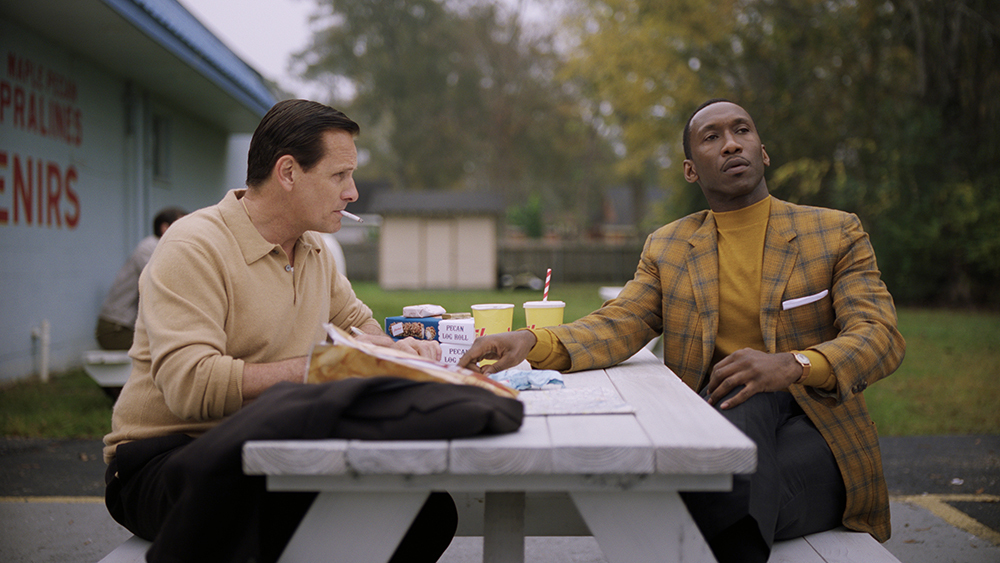Sitting down to watch Green Book in this current atmosphere of ‘cancel culture’ and supreme ‘woke-ness’ is to sit down with a film that you’ve possibly already made your mind up about. Well, that is, if you sit and consume discussions about the entertainment industry 24/7. If that’s not your life (which is likely the majority of people out there), then you’ll enter Green Book with no preconceptions as to what the film will be – and you’ll have a damn good time too.
I’ll jump back to the ‘woke-ness’ part a bit later on as it’s something which I feel may genuinely effect the way people view this film. While the reasoning behind being concerned about the behind the scenes goings on of the Green Book creative team is a salient one, it’s also a perfect textbook example of separating the art from the artist.
Ok, with that in mind, what exactly is Green Book about?
It’s the 1960’s, and black pianist Dr Don Shirley (Mahershala Ali) is about to head off on an eight-week concert tour in the Deep South of the United States. Given the fact that segregation is still alive and well in America, Shirley employs a New York City bouncer, Frank ‘Tony Lip’ Vallelonga (Viggo Mortensen), to work as his driver and ‘protection’ on the tour. Tony Lip is as Italian as they come – big families, talks with hands, he’s the textbook Italian-American stereotype.
He’s also a casual racist. When his wife, Dolores (Linda Cardellini), has workers by to fix the mouldy floorboards in their house, Tony Lip throws out the glasses they drink water out of just because they’re black. All the while, Tony Lip’s brothers and father come by to keep Dolores safe simply because the workmen are black.
Naturally, as he’s the lead character of this story, he’s the audience surrogate for learning about racism in America. With that in mind – this is very much a white person film about racism. It’s very surface level stuff, with the clear intention of getting white folks to understand that hey, life isn’t really that easy for people of colour. This is not to say that Tony Lip doesn’t have problems – he carries his family from pay packet to pay packet, barely making ends meet – it’s just that his problems are completely different from the problems that Dr Shirley lives with.
As the trip in the south rolls on, Tony Lip gradually works out that racism still exists, and figures out exactly how tough Dr Shirley’s life can be. Given the abuse that’s thrown at Dr Shirley, Tony Lip asks the one question that’s on everyone’s mind – why exactly is he putting himself through this endeavour? The response is, naturally, that to combat racism, one must attack the racists and the ignorant with kindness. Dr Shirley leans into his classical music, and openly rejects the ‘whiskey on the piano’ black musician who – to him – panders to the white mans expected motif of what a black man is.
A lot of the negative criticism towards Green Book comes from the way that Tony Lip ‘educates’ Dr Shirley about black culture. And, for me, I immediately had my hackles up when I heard about this – as if mansplaining was bad enough, now we have whitesplaining to deal with too? When will this ever end? But, to applaud the script by Nick Vallelonga (Tony Lip’s son), Brian Hayes Currie, and Peter Farrelly, they make it clear that sure, this is whitesplaining, but just because Dr Shirley is ignorant aspects of black culture doesn’t make him any less black at all. In one Oscar reel moment – of which there are many –, Mahershala Ali shows why he’s one of the finest actors working today as he stands in the pouring rain pleading to a drenched Viggo Mortensen, ‘if I’m not black enough, and if I’m not white enough, then tell me Tony, what am I?’ Andie McDowell, eat your heart out.
Where Green Book has Dr Shirley being educated about fried chicken and Aretha Franklin, it’s worthwhile bringing up the comparison of Spike Lee’s BlacKkKlansman where John David Washington’s Ron Stallworth is educated about the difference between Shaft and Super Fly by Laura Harrier’s Patrice Dumas. Spike Lee has crafted a career where he explores racism and black culture from a black perspective, and while these are some of the finest films ever made, they do often struggle to reach audiences in the ways they deserve to. This is not a problem with the filmmaker, but more a problem with the system that films operate in. Green Book operates in the realm of safety – there’s no point in distancing audiences by throwing relatively unknown pop culture references at them, when the clear short hand of ‘fried chicken’ exists. Is the reliance on this racist? Well, no, but it’s necessary to understand that it can immediately appear problematic without context.
And that’s what Green Book thrives on – context. When you take elements of it by itself, it’s problematic. But, as a whole, Green Book is a wholesome affair that rewards by entertaining and educating. Jokes about Green Book ‘curing racism’ are overblown – yes, Green Book does have an agenda to help discuss racism and to break down barriers, but at the end of the film, it’s clear that racism isn’t ‘cured’ in America, but it is certainly ‘cured’ for one family. And, if there’s one thing to take away from Green Book it’s that change in society starts at home. There’s a clear need to discuss racism in society, and for Australian audiences, the discussion about what constitutes a racist act appears regularly in the media. It’s disheartening that in the year 2019 there are white people still making a case that blackface and Gollywogs are ‘ok’ things to exist. These people – like Tony Lip – may not see themselves as racist, but their actions and their words certainly are racist, and it’s this area that needs to be rectified. What may seem harmless to one group of people can be exceptionally offensive to another group. It shouldn’t take stepping into another’s shoes to see that this offense can hurt, but hey, if simply taking something on face value (ie. ‘blackface is racist because the history of minstrels and cultural appropriation, don’t do it’) doesn’t work, then maybe, just maybe, a film like Green Book can add to the conversation that white people around the world desperately need to have.
Think of it this way – Green Book is good for you in the way that a gummy vitamin is. It’s sweet, has a little bit of helpful stuff in it, is mostly harmless, and goes down a treat. Whereas, a film like BlacKkKlansman is a wholesome diet of fresh fruit and vegetables and healthy eating. Separately, they have value, but when paired together, they tell two sides of an important discussion that needs to be had.
There’s a lot more to Green Book than just an exploration on racism. Viggo Mortensen’s exercising of his comedy muscle is a joy to watch. The scenes where Dr Shirley helps Tony Lip write letters to Dolores are genuinely sweet and caring, showing the beautiful tenderness that the art of love and devotion to another can bring. Mahershala Ali is a joy to watch, giving a performance that pretty much cements a second Oscar for him. The gentle comedy that thrives in the film is the kind that is best discovered for yourself.
So, that’s Green Book. Good, entertaining, informative, and engaging. White folks – take your parents to go see it, they’ll be the ones who will benefit the most from it.
Now, I mentioned the ‘cancel culture’, ‘woke-ness’, that is plaguing Green Book at the moment. This is something that’s worthwhile touching on, so if it’s a discussion you’re interested in reading about, then by all means, head over to the next page and read on.
Director: Peter Farrelly
Cast: Viggo Mortensen, Mahershala Ali, Linda Cardellini
Writers: Nick Vallelonga, Brian Hayes Currie, Peter Farrelly



